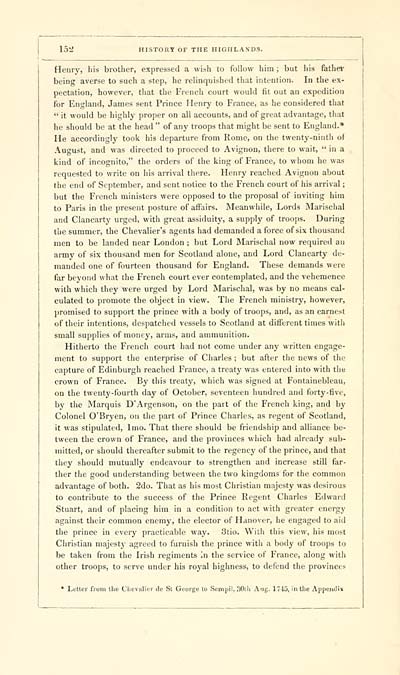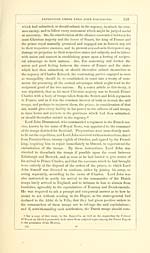Download files
Complete book:
Individual page:
Thumbnail gallery: Grid view | List view

152 HISTOIIT OF THE HIGHLANDS.
Henry, liis brother, expressed a wish to follow him ; but his fathef
being averse to such a step, he relinquished that intention. In the ex-
pectation, however, that the Frtnch court would fit out an expedition
for England, James sent Prince Henry to France, as he considered that
" it would be highly proper on all accounts, and of great advantage, that
he should be at the head " of any troops that might be sent to England.*
He accordingly took his departure from Rome, on the twenty-ninth of
August, and was directed to proceed to Avignon, there to wait, " in a
kind of incognito," the orders of the king of France, to whom he was
requested to write on his arrival there. Henry reached Avignon about
the end of September, and sent notice to the French court of his arrival ;
but the French ministers were opposed to the proposal of inviting him
to Paris in the present posture of affairs. Meanwhile, Lords Marischal
and Clancarty urged, with great assiduity, a supply of troops. During
the summer, the Chevalier's agents had demanded a force of six tliousand
men to be landed near London ; but Lord Marischal now required an
army of six thousand men for Scotland alone, and Lord Clancarty de-
manded one of fourteen thousand for England. These demands were
far beyond what the French court ever contemplated, and the vehemence
with which they were urged by Lord Marischal, was by no means cal-
culated to promote the object in view. The French ministry, however,
promised to support the prince with a body of troops, and, as an earnest
of their intentions, despatched vessels to Scotland at different times with
small supplies of money, arms, and ammunition.
Hitherto the French court had not come under any written engage-
ment to support the enterprise of Charles ; but after the news of the
capture of Edinburgh reached France, a treaty was entered into with the
crown of France. By this treaty, which was signed at Fontainebleau,
on the twenty-fourth day of October, seventeen hundred and forty-five,
by the Marquis D'Argenson, on the part of the French king, and by
Colonel O'Bryen, on the part of Prince Charles, as regent of Scotland,
it was stipulated, Imo. That there should be friendship and alliance be-
tween the crown of France, and the provinces which had alreaily sub-
mitted, or should thereafter submit to the regency of the prince, and that
they should mutually endeavour to strengthen and increase still far-
ther the good understanding between the two kingdoms for the common
advantage of both. 2do. That as his most Christian majesty was desirous
to contribute to the success of the Prince Regent Charles Edward
Stuart, and of placing him in a condition to act with greater energy
against their common enemy, the elector of Hanover, he engaged to aid
the prince in every practicable way. 3tio. With this view, his most
Christian majesty agreed to furnish the prince with a body of troops to
be taken from the Irish regiments in the service of France, along with
other troops, to serve under his royal highness, to defend the provinces
• Letter fiom the Cljevuliiir de St George to Sempil, .lOiU Aug. 1745, in tlie Aiipumli»
Henry, liis brother, expressed a wish to follow him ; but his fathef
being averse to such a step, he relinquished that intention. In the ex-
pectation, however, that the Frtnch court would fit out an expedition
for England, James sent Prince Henry to France, as he considered that
" it would be highly proper on all accounts, and of great advantage, that
he should be at the head " of any troops that might be sent to England.*
He accordingly took his departure from Rome, on the twenty-ninth of
August, and was directed to proceed to Avignon, there to wait, " in a
kind of incognito," the orders of the king of France, to whom he was
requested to write on his arrival there. Henry reached Avignon about
the end of September, and sent notice to the French court of his arrival ;
but the French ministers were opposed to the proposal of inviting him
to Paris in the present posture of affairs. Meanwhile, Lords Marischal
and Clancarty urged, with great assiduity, a supply of troops. During
the summer, the Chevalier's agents had demanded a force of six tliousand
men to be landed near London ; but Lord Marischal now required an
army of six thousand men for Scotland alone, and Lord Clancarty de-
manded one of fourteen thousand for England. These demands were
far beyond what the French court ever contemplated, and the vehemence
with which they were urged by Lord Marischal, was by no means cal-
culated to promote the object in view. The French ministry, however,
promised to support the prince with a body of troops, and, as an earnest
of their intentions, despatched vessels to Scotland at different times with
small supplies of money, arms, and ammunition.
Hitherto the French court had not come under any written engage-
ment to support the enterprise of Charles ; but after the news of the
capture of Edinburgh reached France, a treaty was entered into with the
crown of France. By this treaty, which was signed at Fontainebleau,
on the twenty-fourth day of October, seventeen hundred and forty-five,
by the Marquis D'Argenson, on the part of the French king, and by
Colonel O'Bryen, on the part of Prince Charles, as regent of Scotland,
it was stipulated, Imo. That there should be friendship and alliance be-
tween the crown of France, and the provinces which had alreaily sub-
mitted, or should thereafter submit to the regency of the prince, and that
they should mutually endeavour to strengthen and increase still far-
ther the good understanding between the two kingdoms for the common
advantage of both. 2do. That as his most Christian majesty was desirous
to contribute to the success of the Prince Regent Charles Edward
Stuart, and of placing him in a condition to act with greater energy
against their common enemy, the elector of Hanover, he engaged to aid
the prince in every practicable way. 3tio. With this view, his most
Christian majesty agreed to furnish the prince with a body of troops to
be taken from the Irish regiments in the service of France, along with
other troops, to serve under his royal highness, to defend the provinces
• Letter fiom the Cljevuliiir de St George to Sempil, .lOiU Aug. 1745, in tlie Aiipumli»
Set display mode to: Large image | Transcription
Images and transcriptions on this page, including medium image downloads, may be used under the Creative Commons Attribution 4.0 International Licence unless otherwise stated. ![]()
| Early Gaelic Book Collections > Ossian Collection > History of the Highlands and of the Highland clans > Volume 3 > (182) |
|---|
| Permanent URL | https://digital.nls.uk/79654606 |
|---|
| Description | Vol. III. |
|---|---|
| Shelfmark | Oss.249 |
| Attribution and copyright: |
|
| Description | Selected books from the Ossian Collection of 327 volumes, originally assembled by J. Norman Methven of Perth. Different editions and translations of James MacPherson's epic poem 'Ossian', some with a map of the 'Kingdom of Connor'. Also secondary material relating to Ossianic poetry and the Ossian controversy. |
|---|
| Description | Selected items from five 'Special and Named Printed Collections'. Includes books in Gaelic and other Celtic languages, works about the Gaels, their languages, literature, culture and history. |
|---|

